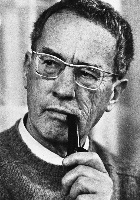Alfred Andersch
Alfred Andersch Poems
Alfred Andersch Biography
Alfred Hellmuth Andersch was a German writer, publisher, and radio editor. The son of a conservative East Prussian army officer, he was born in Munich, Germany and died in Berzona, Ticino, Switzerland. In 1930, after an apprenticeship as a bookseller, Andersch became a youth leader in the Communist Party. As a consequence, he was held for 6 months in the Dachau concentration camp in 1933. He then left the party and entered a depressive phase of "total introversion". It was during this period that he first became engaged in the arts, adopting the stance that became known as innere Emigration ("internal emigration") – despite remaining in Germany, he was spiritually opposed to Hitler's regime. In 1940, Andersch was conscripted into the Wehrmacht, but deserted at the Arno Line in Italy on 6 June 1944. He was taken to the United States as a prisoner of war and interned at Camp Ruston, Louisiana and other POW camps. He became the editor of a prisoners' newspaper, Der Ruf (The Call). Having returned to Germany, he worked from 1945 as an editing assistant for Erich Kästner's Neue Zeitung in Munich. From 1946 to 1947, he worked alongside Hans Werner Richter to publish the monthly literary journal Der Ruf, which was sold in the American occupation zone of Germany. The publication was discontinued following the non-renewal of its license by the U.S military government. Presumably, the discontinuation of "Der Ruf" followed "promptings by the Soviet authorities, provoked by Hans Werner Richter's open letter to the French Stalinist, Marcel Cachin." In the following years, Andersch worked with the literary circle Group 47, members of which included the authors Ingeborg Bachmann, Wolfgang Hildesheimer, Arno Schmidt, Hans Magnus Enzensberger and Helmut Heissenbüttel, among others. 1948 saw the publication of Andersch's essay "Deutsche Literatur in der Entscheidung" (German Literature at the Turning Point), in which he concluded, in the spirit of the American post-war "re-education" programme, that literature would play a decisive role in the moral and intellectual changes in Germany. Beginning in 1948, Andersch was a leading figure at radio stations in Frankfurt and Hamburg. In 1950, he married the painter Gisela Dichgans. His autobiographical work Die Kirschen der Freiheit (The Cherries of Freedom) was published in 1952, in which Andersch dealt with the experience of his wartime desertion and interpreted it as the "turning point" (Entscheidung) at which he could first feel free. On a similar theme, he published in 1957 perhaps the most significant work of his career, Sansibar oder der letzte Grund (published in English as Flight to Afar). A few of Andersch's books were turned into films. From 1958, Andersch lived in Berzona in Switzerland, where he became mayor in 1972. After Sansibar followed the novels Die Rote in 1960, Efraim in 1967, and, in 1974, Winterspelt, which is, thematically, very similar to Sansibar, but is more complex in its composition. In 1977, he published the poetry anthology empört euch der himmel ist blau [sic]. Alfred Andersch died on 21 February 1980 in Berzona, Ticino. The incomplete story Der Vater eines Mörders (The Father of a Murderer) was published posthumously in the same year. Themes. Alfred Andersch served as an analyst of contemporary issues for the post-war generation. In his works, he described, above all, outsiders, and dealt with his political and moral experiences. He often raised questions about the free will of the individual as a central theme. In numerous essays, he stated his opinion on literary and cultural issues; he frequently pointed out the importance of Ernst Jünger.)
The Best Poem Of Alfred Andersch
Credible Season
Spring lies
when it Struts
green
over the meadows
when it drivels
windily
of april
then spring
is lying
it is autumn
the red death
sitting in the sumach tree
it is autumn
that tells the truth
